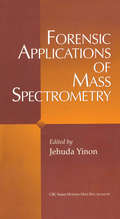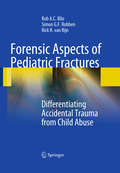- Table View
- List View
Forensic Analysis of Tattoos and Tattoo Inks
by Michelle D. MirandaForensic Analysis of Tattoos and Tattoo Inks is the single most comprehensive resource on the analysis of tattoo inks and use of tattoos as a tool in forensic investigations and criminalistics. The book begins with a history of tattoos and tattoo inks, and covers the use of tattoos throughout time as aids in the identification of individuals. It pr
Forensic Anthropology (Solving Crimes With Science: Forensics)
by Angela LibalWelcome to the exciting world of forensic investigation--the science of solving crimes. This introduces the field of forensic anthropology, where scientists and criminal investigators use the human skeleton to solve some of the world's most mysterious and violent crimes. From the nineteenth-century murderer who boiled his wife in a vat of acid, to the modern-day pig farmer accused of murdering more than sixty women, forensic anthropology shows how even the tiniest fragments of bones can reveal the identities of victims as well as killers. From mass-transit accidents to war to genocide and terrorist attacks, this science also pieces together the most scattered and seemingly unidentifiable remains. Using recent finds such as bags of bones in the woods, or the five-thousand-year-old skeleton of a victim of foul play, forensic detectives use the smallest clues, revealing a massive crime-recording device: the human body. See how the dead do tell tales to those who know how to listen!
Forensic Anthropology: 2000 to 2010
by Sue Black Eilidh FergusonAdvances in our ability to analyse information from skeletal remains and subsequent developments in the field of forensic anthropology make it possible to identify more victims of homicides, mass-fatality disasters, and genocide. Summarizing the vast collection of international literature that has developed over the past decade, this volume explores critical themes fundamental to this evolving discipline. Topics discussed include age determination in juveniles and adults; sex, race, and ancestry determination; stature determination; dental and facial identification; skeletal trauma and bone pathology; taphonomy and comparative osteology; and identification from soft tissues.
Forensic Anthropology: A Comprehensive Introduction, Second Edition
by Natalie R. Langley MariaTeresa A. Tersigni-TarrantThis robust, dynamic, and international field has grown to include interdisciplinary research, continually improving methodology, and globalization of training. Reflecting the diverse nature of the science from experts who have shaped it, Forensic Anthropology: A Comprehensive Introduction Second Edition builds off of the success of the first edition and incorporates standard practices in addition to cutting-edge approaches in a user-friendly format, making it an ideal introductory-level text.
Forensic Anthropology: A Comprehensive Introduction, Second Edition
by Natalie R. Langley MariaTeresa A. Tersigni-TarrantThis robust, dynamic, and international field has grown to include interdisciplinary research, continually improving methodology, and globalization of training. Reflecting the diverse nature of the science from experts who have shaped it, Forensic Anthropology: A Comprehensive Introduction Second Edition builds off of the success of the first edition and incorporates standard practices in addition to cutting-edge approaches in a user-friendly format, making it an ideal introductory-level text.
Forensic Anthropology: Contemporary Theory and Practice
by Debra Komar Jane BuikstraForensic anthropology is a vastly popular and rapidly changing profession, yet to date there has been no volume that reflects the current state of the discipline and forecasts its future. <p><p> The first comprehensive text in the field, Forensic Anthropology: Contemporary Theory and Practice examines the medical, legal, ethical, and humanitarian issues associated with forensic anthropology, current forensic methods, and bio-historical investigations. <p><p> Forensic Anthropology offers a unique synthesis of theoretical and methodological coverage. Rather than simply describing methodology, Komar and Buikstra place forensic anthropology in the broader context of medico-legal death investigations, critically evaluating practical techniques in a scientific framework and detailing the anthropologist's role in relation to both law enforcement and the medical examiner or coroner. <p><p> The authors review the current state of the field, emphasizing recent changes to the judicial guidelines regarding the admissibility of scientific evidence in court. They highlight the impact of these rulings, the increased need for scientific rigor, and the evolving nature of anthropological studies, preparing students to function effectively in the demanding judicial system that will evaluate their work in the future. The text also stresses the vital importance of research in the development of forensic applications of anthropology. <p><p> Forensic Anthropology is enhanced by numerous illustrative case studies and more than ninety photos and illustrations that help to deepen and enrich students' understanding of the material. Coauthored by a top authority in forensic anthropology and an anthropologist whose fieldwork has included medico-legal death investigation in Bosnia, Kosovo, Iraq, and Darfur, this volume is an in-depth and indispensable guide to the dynamic and rapidly professionalizing field of forensic anthropology.
Forensic Applications of Gas Chromatography (Analytical Concepts in Forensic Chemistry)
by Michelle Groves Carlin John Richard DeanSeveral areas of forensic science use the technique of gas chromatography, ranging from fire analysis to the investigation of fraudulent food and perfumes. Covering the essentials of this powerful analytical technique, Forensic Applications of Gas Chromatography explains the theory and shows applications of this knowledge to various realms of foren
Forensic Applications of High Performance Liquid Chromatography (Analytical Concepts in Forensic Chemistry)
by Shirley Bayne Michelle CarlinChromatography has many roles in forensic science, ranging from toxicology to environmental analysis. In particular, high-performance liquid chromatography (HPLC) is a primary method of analysis in many types of laboratories. Maintaining a balance between practical solutions and the theoretical considerations involved in HPLC analysis, Forensic App
Forensic Applications of Mass Spectrometry
by Jehuda Yinon Werner A. Baumgartner Wolfgang Bertsch Jean Louis Brazier Chen-Chih Cheng Bongchul Chung John T. Cody Thomas D. Donahue Dean D. Fetterolf Rodger L. Foltz Gene F. Hayes Virginia A. Hill Gunther Holzer Dongseok Lho Thomas O. Munson Jongsei Park Songja Park Henry ScholtzForensic Applications of Mass Spectrometry combines the most current developments in applications of mass spectrometry techniques to forensic analyses. The techniques discussed include:capillary-GC/MSthermospray-LC/MStandem mass spectrometry (MS/MS)pyrolysis-GC/MSisotope ratio mass spectrometryThe applications include:analysis of body fluids and hair for drugs of abusedrug testing in sportsanalysis of accelerants in fire debrisdetection of hidden explosives in luggage and mailidentification of explosives in post-explosion debrisexamination of evidential materials (paints, fibers, synthetic polymers)authentication of regulated products (flavoring substances, fruit juices)protection of industrial products by isotopic signature
Forensic Archaeology and New Multidisciplinary Approaches: Topics Discussed During the 2018-2023 European Meetings on Forensic Archaeology (EMFA) (Soil Forensics)
by Pier Matteo Barone Wj Mike GroenThis book presents the latest research and developments in forensic archaeology, as discussed at the European Meetings on Forensic Archaeology (EMFA) from 2018 to 2023. It captures the dynamic and multidisciplinary nature of the field, highlighting the challenges and innovations that have emerged over the last five years. Divided into three main parts, the book addresses critical aspects of forensic archaeology and its diverse applications. Part I on Forensic Archaeology from the Crime Scene explores cutting-edge methodologies and their application in various forensic contexts. Part II focuses on Forensic Anthropology and Humanitarian Investigations, presenting the study of human remains and the application of forensic archaeology in humanitarian contexts. The final part addresses Heritage Crimes and the role of forensic archaeology in investigating and preventing the illegal trade in artifacts and the destruction of cultural heritage sites. Contributions from both EMFA presenters and external experts provide a rich tapestry of theoretical advances and practical applications. This new volume is essential for forensic archaeologists, forensic scientists, law enforcement professionals, and scholars interested in the intersection of archaeology and forensic science. It serves as an important resource for those seeking to understand the complexities of forensic investigations.
Forensic Archaeology: A Global Perspective (Soil Forensics Ser.)
by Nicholas Márquez-Grant W. J. Groen Rob JanawayForensic archaeology is mostly defined as the use of archaeological methods and principles within a legal context. However, such a definition only covers one aspect of forensic archaeology and misses the full potential this discipline has to offer. This volume is unique in that it contains 57 chapters from experienced forensic archaeological practitioners working in different countries, intergovernmental organisations or NGO’s. It shows that the practice of forensic archaeology varies worldwide as a result of diverse historical, educational, legal and judicial backgrounds. The chapters in this volume will be an invaluable reference to (forensic) archaeologists, forensic anthropologists, humanitarian and human rights workers, forensic scientists, police officers, professionals working in criminal justice systems and all other individuals who are interested in the potential forensic archaeology has to offer at scenes of crime or places of incident. This volume promotes the development of forensic archaeology worldwide. In addition, it proposes an interpretative framework that is grounded in archaeological theory and methodology, integrating affiliated behavioural and forensic sciences.
Forensic Archaeology: Advances in Theory and Practice
by John Hunter Margaret CoxThis updated edition of a textbook universally hailed as an indispensable guide, is a complete introduction to the methods and means of forensic archaeology. Incorporating new advances in the field, new case studies, and charting the growth and development of the subject, Forensic Archaeology examines the four main fields of recovery, search, skeletal analysis and analytical science, and how the concepts and methods of traditional archaeology can by utilized within criminal investigations. The authors provide in-depth chapters that discuss: search and location the various constraints and issues posed by an increasingly complex legal environment the archaeology of individual and mass graves how the subject has evolved to include international investigations of human rights links with forensic anthropology forensic geophysical survey. This is an invaluable resource that will provide students, researchers, academics and the general reader alike with a fascinating introduction to this complex and crucial subject.
Forensic Art and Illustration
by Karen T. TaylorAs the number of stranger-on-stranger crimes increases, solving these crimes becomes more challenging. Forensic illustration has become increasingly important as a tool in identifying both perpetrators and victims. Now a leading forensic artist, who has taught this subject at law enforcement academies, schools, and universities internationally, off
Forensic Aspects of Hypoglycaemia: First Edition
by Vincent MarksThe Forensic Aspects of Hypoglycaemia succinctly covers the medicolegal considerations of hypoglycaemia in a variety of scenarios including driving fatalities, petty crime, homicide and suicide. Covering the definitions and diagnosis of hypoglycaemia to its bearing on criminal behavior, this book draws on the author's extensive experience and contains a wealth of information for physicians and lawyers, including cases from the author's past and notable cases in the public domain.
Forensic Aspects of Pediatric Fractures
by Rick R. van Rijn Rob A. Bilo Simon G. RobbenFractures are a common finding in children and it is estimated that 2.1% of all children will suffer at least one fracture before the age of 16. With young children in particular, the question may arise if this is related to child abuse. The aim of this book is to help physicians involved in child abuse cases to interpret radiological findings in light of the forensic circumstances under which they occurred. The authors present up-to-date literature related to the mechanisms underlying non-accidental cases of trauma. In this book not only the radiological findings in child-abuse are discussed, but more importantly, these findings are analyzed from a forensic perspective. Careful attention is paid to evidence regarding reported trauma mechanisms and their clinical outcome; for example, can a fall from a couch result in a femoral fracture, and if not, where is the supporting evidence?
Forensic Biology
by Richard LiFocusing on forensic serology and forensic DNA analysis, this book introduces students to the methods and techniques utilized by forensic biology laboratories. Using schematic illustrations to clarify concepts, this second edition explores the latest DNA profiling tools, contains three new chapters, and provides 200 new images. It also includes new tables for many chapters. Covering the full scope of forensic biology, the book uses an accessible style designed to enhance students education and training so they are prepared, both in the laboratory and in the field.
Forensic Biology
by Richard LiForensic Biology, Third Edition, provides students with a general understanding of forensic biology, particularly in forensic serology and forensic DNA analysis, and addresses rapid advancements in the field over the past few years.The book is divided into 26 chapters that are designed to be covered in a single-semester course for students majoring in forensic science, with the aim of equipping students with the knowledge needed to understand and apply new real-world techniques and methods to prepare them for entry into the field.The third edition: Provides clear explanations of the principles involved in forensic identification and the analysis of biological evidence Explains the techniques used in forensic body fluid identification and DNA profiling, both in the field and in the laboratory Discusses the benefits and limitations of various forensic biology techniques Includes over four hundred color illustrations Includes over three thousand in-text citations This updated and comprehensive volume on forensic biology is suitable for use both in the classroom and as a reference for practicing professionals.
Forensic Biomechanics and Human Injury: Criminal and Civil Applications - An Engineering Approach
by Harold Franck Darren FranckForensic Biomechanics and Human Injury: Criminal and Civil Applications � An Engineering Approach provides a concise, comprehensive overview of human anatomy and the biomechanical factors involved in human injury. It describes the methodologies used to compute the various forces, stresses, and energies required to injure the human body.The book cov
Forensic Botany: Principles and Applications to Criminal Casework
by Heather Miller CoyleIncreasingly, forensic scientists use plant evidence to reconstruct crimes. The forensic aspects of this subject require an understanding of what is necessary for botanical evidence to be accepted in our judicial system.Bringing together the latest information into a single resource, Forensic Botany: Principles and Applications to Criminal
Forensic Botany: Principles and Applications to Criminal Casework
by Heather Miller CoyleForensic Botany: Principles and Applications to Criminal Casework, Second Edition updates what, at the time, was the very first book published on the subject. This latest edition offers a concise introduction to plant identification, biology, genetics, and how to utilize and apply botanical evidence in criminal cases.In recent years, forensic botany and the use of various plant and plant‑derived evidence have been increasingly utilized in criminal investigations and court cases. Likewise, forensic palynology and other such terms have entered the vernacular as botanical sciences have widened the applications in which such evidence can help solve cases. This includes the use of current and emergent genetic markers and DNA technology, toxicology, diatoms, and pollen. The numerous advances since the last edition was published necessitated added coverage of the technology and testing capabilities that have achieved new levels as the field has developed.The chapters are written by some of the top experts in the field. Every chapter in the Second Edition is fully updated, with several new chapters focusing on Random Amplified Polymorphic DNA (RAPD), Restriction Fragment Length Polymorphism (RFLP), and Amplified Fragment Length Polymorphism (AFLP), plant‑derived toxins and forensic toxicology, identifying ancient plants used in burial practices for dating sites, digested plants as evidence, and more.Forensic Botany, Second Edition provides scientists working with DNA, trace evidence, and botanical evidence—as well as investigators and legal professionals—with a thorough understanding of the latest advances and current capabilities in utilizing such evidence in investigating and adjudicating criminal cases.
Forensic Cardiovascular Medicine
by Basil RuDuskyAdvance Praise for Forensic Cardiovascular Medicine"Using his vast experience in the medical-legal theater, Dr. RuDusky addresses a very complicated field in a simple and concise manner. Stressing the importance of honesty, integrity, and accuracy of data, he provides an insightful and interesting approach to the problems facing today's medical com
Forensic Chemistry
by David E. NewtonForensic Chemistry examines the most important recent developments in this field and their contribution to crime investigation. The book explores the expanding array of instruments, on-site equipment, chemicals, and other means with which evidence is examined, as well as state-of-the-art forensic procedures.
Forensic Chemistry (Essentials Of Forensic Science Ser.)
by Suzanne BellForensic Chemistry, Third Edition, the new edition of this ground-breaking book, continues to serve as the leading forensic chemistry text on the market. Fully updated, this edition describes the latest advances in current forensic chemistry analysis and practice. New and expanded coverage includes rapid advances in forensic mass spectrometry, NMR, and novel psychoactive substances (NPSs). Topics related to seized drug analysis, toxicology, combustion and fire investigation, explosives, and firearms discharge residue are described and illustrated with case studies. The role of statistics, quality assurance/quality control, uncertainty, and metrology are integrated into all topics. More pharmacological and toxicokinetic calculations are presented and discussed. Hundreds of color figures, along with graphs, illustrations, worked example problems, and case descriptions are used to show how analytical chemistry is applied to forensic practice. Topics covered offer students insight into the legal context in which forensic chemistry is conducted and introduces them to the sample types and sample matrices encountered in forensic laboratories.
Forensic Computer Crime Investigation (International Forensic Science and Investigation)
by Thomas A. JohnsonThe Digital Age offers many far-reaching opportunities - opportunities that allow for fast global communications, efficient business transactions and stealthily executed cyber crimes. Featuring contributions from digital forensic experts, the editor of Forensic Computer Crime Investigation presents a vital resource that outlines the latest strategi
Forensic Cremation Recovery and Analysis
by Scott I. FairgrieveThis book provides a synopsis of the challenges involved in the recovery and interpretation of cremains from the point of discovery to the end of the analysis. It considers the capacity and mechanism of fire to alter the chemical and physical properties of materials, particularly those of human tissues, and emphasizes a flexible approach to the collection of cremains. A significant portion of the book examines the effects of fire on bone and the ability to determine trauma. It also evaluates the practical use of dental tissue and DNA for identification and as an aid to the investigation.























